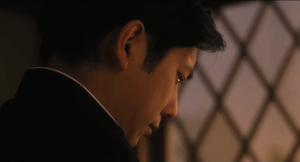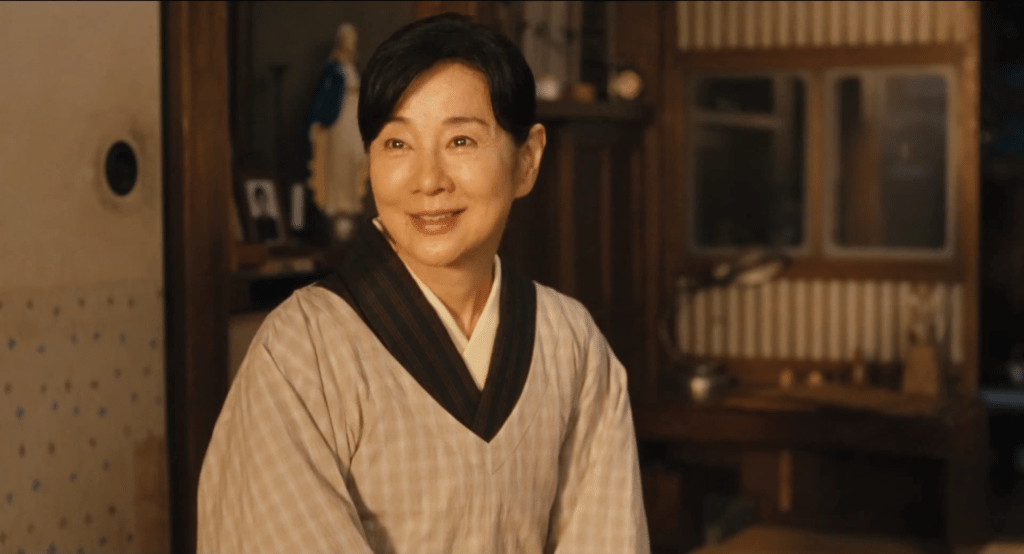 Nagasaki: Memories of My Son (Haha to Kuraseba)
Nagasaki: Memories of My Son (Haha to Kuraseba)
Director: Yoji Yamada
Writers: Yoji Yamada and Emiko Hiramatsu
Starring: Sayuri Yoshinaga, Kazunari Ninomiya, Haru Kuroki
Japanese premiere: December 12, 2015
North American premiere: June 9, 2016
Few events in history have loomed as large in the fabric of American history as the atomic bomb attacks on Nagasaki and Hiroshima. Few events have had such a deep, lasting effect on a single country’s population and development–Japan’s people have not been the same since.
Celebrated director Yoji Yamada centers a mother’s reflection in his take on the bombings in Nagasaki: Memories of My Son (Haha to Kuraseba), released in Japanese cinemas last December, and premiering at the Toronto Japanese Film Festival on June 9, 2016. The focus on a single family, and the ripples of a young man’s death, might seem like a strange decision, considering how many thousands of people died on that terrible day. Indeed, the singular lens that Yamada uses carefully avoids mentions of the atrocities committed by Japanese soldiers during World War II. Yamada closes up that part of the shop, in a way, situating this particular story as an entry point to the history.
Nobuko Fukuhara, played with an obvious solemnity by veteran actress Sayuri Yoshinaga, bids her son Koji goodbye one August morning. Neither are aware that it will be the last time they will see each other alive. Koji’s death comes in the disorienting flash of the atomic bomb, the last few minutes of his anatomy class interspersed with “footage” of the American soldiers dropping the bomb on Nagasaki. The immediate impact and aftermath is left off-screen–Yamada passes over the suffering to take viewers three years into the future.
This time shift is the biggest challenge of the film, and it occurs within the first 15 minutes. Koji’s death is the start of the story, but it happens too quickly for viewers to really feel much for either Nobuko or Koji specifically. It necessitates a leap of faith that isn’t quite earned or justified yet. We are meant to take Nobuko’s grief in its muted form after some time has passed, instead of experiencing it.
Much of Nagasaki: Memories of My Son revolves around the moments that Nobuko relives through conversations with Koji, who may or may not be a figment of Nobuko’s grief. Why he hasn’t materialized sooner is left unexplained, and his reasons for appearing are only hinted at vaguely. Kazunari Ninomiya–who would later go on to win a Japan Academy Award for his performance–does play off Yoshinaga’s cues beautifully, opening the path for the audience to become emotionally bound to his life as it was. We hear about Koji’s foibles and successes, and Ninomiya rises to the task of making Koji into more than just a ghost.

He doesn’t rely on the minimal flashbacks that Yamada supplies, instead grasping the emotional beats that Yoshinaga sets with a careful look, and letting silence speak for him when it can. Their camaraderie and clear understanding of each other’s strengths as actors provide the film with the heart it needs, because the script itself is not strong enough to carry its characters.
We see this in the treament of Koji’s beloved childhood sweetheart Machiko Sata. Haru Kuroki certainly tries to inject playfulness and fading heartache into her character, but the film seems content to leave her as a tragic, pure woman, without much of a personality outside of her relationship to Koji and Nobuko. Koji’s memories of her maintain that narrative, and it’s only after he declares that he would be fine with her forgetting him that we start to see Machiko moving forward with her life.

I don’t know that I would say that Nobuko is the central character in this film–rather, she seems to share that spotlight with her son. Her strength is incomparable, yes, and her devotion to her family (though all deceased) is admirable. Koji might be a figment of her imagination, but he’s also the audience’s gateway to Nobuko’s innermost thoughts and fears. As a study of the effects of the war, Nagasaki: Memories of My Son doesn’t quite succeed. As an intimate character study, the film is much more powerful, and its dialogue-heavy script relies on the actors to understand that. Between them, Yoshinaga and Ninomiya manage beautifully, and their performances will likely bring tears to viewers’ eyes, but that’s really what one signs up for in a film like this.

